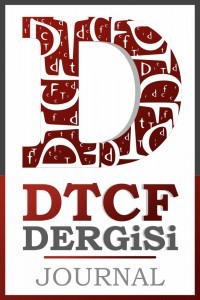DJUNA BARNES'IN LYDIA STEPTOE ÖYKÜLERİ'NDE YIKICI KATEGORİLER OLARAK GÜNLÜK BİÇİMİ VE TOPLUMSAL CİNSİYET
Djuna Barnes, Lydia Steptoe Öyküleri, Günlük, Tür, Edimlilik, Öznellik
THE DIARY FORM AND GENDER AS SUBVERSIVE CATEGORIES IN DJUNA BARNES'S THE LYDIA STEPTOE STORIES
Djuna Barnes, The Lydia Steptoe Stories, Diary, Genre, Performativity, Subjectivity,
___
- References
- Barnes, Djuna. (2019). The Lydia Steptoe Stories. Gloucester: Faber & Faber.
- Besnault-Levita, Anne. (2007). Genre and the Short Story. Companion to the British Short Story. Andrew Maunder (Ed.). New York: Facts on File Inc.
- Bockting, Margaret. (1997). The Great War and Modern Gender Consciousness: The Subversive Tactics of Djuna Barnes. Mosaic: An Interdisciplinary Critical Journal, (30)3, 21-38.
- Broe, Mary Lynn. (1991). Silence and Power: A Reevaluation of Djuna Barnes. Illinois: Illinois UP.
- Butler, Judith. (2001). “From Gender Trouble”. The Norton Anthology of Theory and Criticism. Vincent B. Leitch (Ed.). W. W. Norton & Company, Inc.
- Caselli, Daniela. (2022). ‘Tendency to Precocity’ and ‘Childish Uncertainties’ of a ‘Virago at Fourteen’: Djuna Barnes’s ‘The Diary of a Dangerous Child.’ The Yearbook of English Studies, 32, 186–204.
- Cixous, Helene. (1988). Extreme Fidelity. Writing Differences: Readings from the Seminar of Helene Cixous. Susan Sellers (Ed.). Open UP, 9-36.
- ---, Keith Cohen and Paula Cohen. (1976). The Laugh of the Medusa. Signs. 1(4), 875-893.
- Doane, Mary Ann. (1982). Film and the Masquerade: Theorising the Female Spectator. Screen, (23) 3-4, 74–88.
- Gamble, Sarah. (2022). Gender and Transgender Criticism. Introducing Criticism in the 21th century. Julian Wolfreys (Ed.). Edinburgh: Edinburgh UP.
- Herring, Phillip. (1996). Introduction. Collected Stories of Djuna Barnes. Los Angeles: Sun & Moon Press, 7–24.
- ---. (1995). The Life and Work of Djuna Barnes. New York: Viking.
- Huff, Cynthia. (1989). ‘That Profoundly Female, and Feminist Genre’: The Diary as Feminist Practice. Women’s Studies Quarterly, 17 (3/4), 6-14.
- Irigaray, Luce. (1990). This Sex Which Is Not One. Catherine Porter & Carolyn Burke (Trans.). Ithaca: Cornell University Press.
- Jones, Ann Rosalind. (1981). Writing the Body: Toward an Understanding of ‘L’Ecriture Feminine’. Feminist Studies, 7(2), 247-263.
- Kannenstine, Louis F. (1977). The Art of Djuna Barnes: Duality and Damnation. New York: New York UP.
- Martins, Susana S. (1999). Gender Trouble and Lesbian Desire in Djuna Barnes’s Nightwood. Frontiers: A Journal of Women Studies, 20(3), 108-126.
- Messerli, Douglas. (1975). Djuna Barnes: A Bibliography. David Lewis,16-18.
- Raoul, Valerie. (1989). Women and Diaries: Gender and Genre. Mosaic: An Interdisciplinary Critical Journal, 22(3), 5765.
- Rich, Adrienne. (1979). On Lies, Secrets, and Silence. New York: Norton.
- Shin, Ery. (2014). Djuna Barnes, History’s Elsewhere, and the Transgender. Journal of Modern Literature, 37(2), 20-38.
- Ward, David C. “Hide/Seek” and Historian at the National Portrait Gallery (https://www.youtube.com/watch?v=47p7Gt5IHc8).
- Warren, Diane. (2008). Djuna Barnes’ Consuming Fictions. Burlington: Ashgate.
- ---. (2009). Review by Meryl Altman. Tulsa Studies in Women's Literature, 28(1), 186-190.
- Wittig, Monique. (2013). One Is Not Born Woman (1981). Feminist Theory Reader: Local and Global Perspectives. Carole McCann and Seung-kyung Kim (Eds.). New York: Routledge. ---. (1983). Point of View: Universal or Particular. Feminist Issues, 3(2), 63-69.
- Woolf, Virginia. (2012). A Writer’s Diary: Being Extracts from the Diary of Virginia Woolf [1953]. Eastford, CT: Martino Fine Books.
- Thorpe, Vanessa. (2009). “Banned sex play now a teenage hit.” https://www.theguardian.com/stage/2009/jan/31/spring-awakening-sex-theatre-stage
- Yayın Aralığı: Yılda 2 Sayı
- Başlangıç: 1942
- Yayıncı: Ankara Üniversitesi
VERİ MADENCİLİĞİNİN ÖNEMİ VE KÜTÜPHANELERDE KULLANIMI
Korcan DOĞAN, Sacit ARSLANTEKİN
MODERNLEŞME SÜRECİNDE BEŞİKTAŞ’TA SOSYAL MEKÂNLAR (TANZİMAT’IN İLÂNINDAN II. MEŞRUTİYET’E KADAR)
KÜÇÜK BİR RUS GÖÇMENİN DEVRİM, GÖÇ VE İSTANBUL ANILARI
DÂRÜLFÜNÛN HOCASI SALİH ZEKİ’NİN FİZİK TARİHİ KONULU İKİ MAKALESİ
İTALYA’NIN ARNAVUTLUK’U İŞGALİNİN TÜRK BASININA VE TÜRK DIŞ POLİTİKASINA YANSIMASI
LEYDİ MARY WROTH’UN PAMPHILIA TO AMPHILANTUS ADLI ESERİNDE BİR KADIN ŞAİRİN PORTRESİ
CARNAP VE NEURATH'IN FEMİNİST BİLİM FELSEFESİ AÇISINDAN OLASI BİR DEĞERLENDİRMESİ
